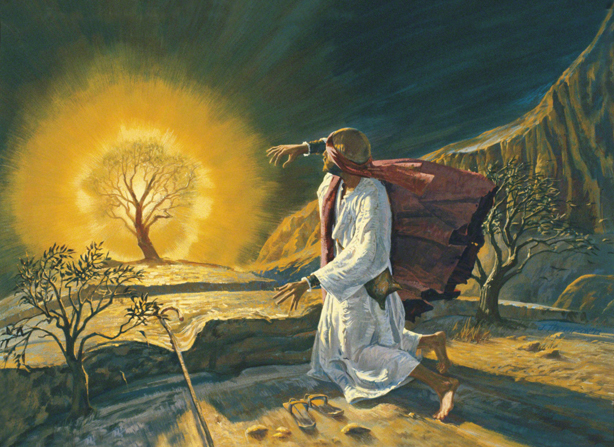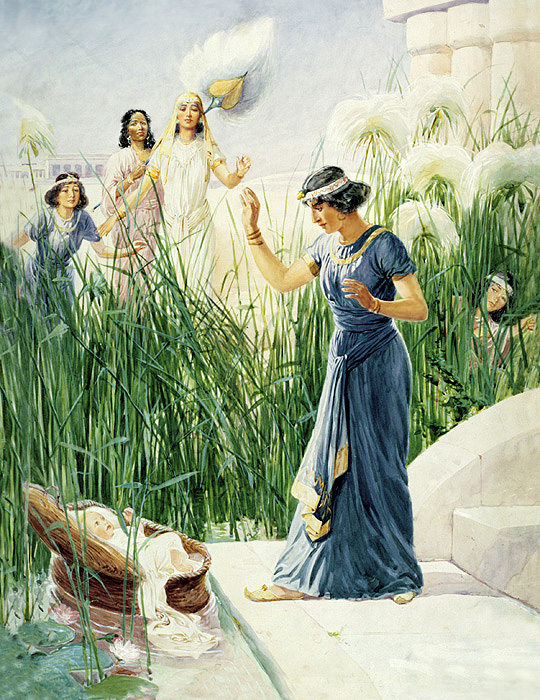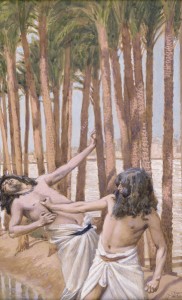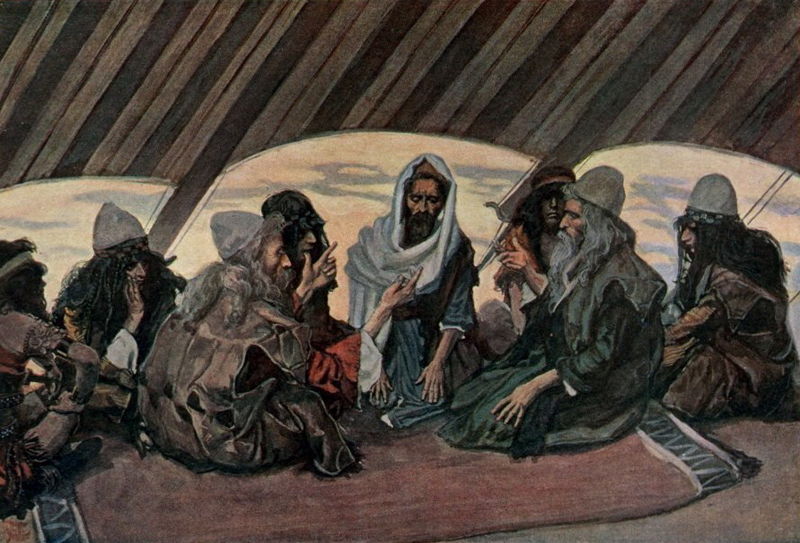This is the first in a four-part series about Moses and the Exodus.
The story of Moses leading the children of Israel out of bondage and the miracles leading up to it is powerful. For thousands of years, Jews and Christians have found spiritual strength in the lessons derived from this Old Testament experience. Even Hollywood has made movies based on this Biblical account. But some modern readers wonder about the historicity of the Bible and its stories, including this Old Testament account. A commentary on the Bible by The Church of Jesus Christ of Latter-day Saints states:
There is a broad range of approaches within the vast mosaic of biblical interpretation. For example, biblical inerrancy maintains that the Bible is without error and contradiction; biblical infallibility holds that the Bible is free from errors regarding faith and practice but not necessarily science or history; biblical literalism requires a literal interpretation of events and teachings in the Bible and generally discounts allegory and metaphor; and the “Bible as literature” educational approach extols the literary qualities of the Bible but disregards its miraculous elements.
So just how should we interpret the message of this Bible story? The historical and spiritual references weave together an intriguing tapestry of this Old Testament tale. It’s a story full of miracles and God’s hand in the lives of His people. Both New Testament and Book of Mormon prophets speak of this Old Testament prophet and his people. Ancient and modern scholars also write of them. After studying many sources, here is one Mormon’s perspective on Moses and the Exodus.
Growth of the Israelites in Egypt
The beginning of this story is just as important as the end. And both show the ways in which God works His miracles and fulfills His promises. This story begins not with Moses, nor even Joseph who was brought as a slave into Egypt, but with the biblical prophet Abraham. God promised Abraham that he would be fruitful and the father of many nations (Genesis 17:5-6). It was for this reason that Joseph, son of Jacob, was brought into Egypt and that he, in turn, brought his family. Elder Mark E. Petersen explained (Moses: Man of Miracles. Salt Lake City: Deseret Book Co., 1977, pp. 27-30):
The fulfillment of God’s promises to Abraham required that Israel should become numerous. To accomplish this, the little family, numbering only 70 persons (Genesis 46:26–27), needed sufficient time and a peaceful place in which to grow. Egypt was that place. …
… Palestine was a battleground for warring nations that moved back and forth in their conquests between the Nile and the Euphrates. Israel would have found no peace there. They required stable conditions for their eventual growth and development. …
But Egypt was only to be a place of preparation for the Israelites. Biblical scholar Nahum M. Sarna wrote:
The domicile of the Israelites in Egypt is not regarded as permanent. Most striking is the contrast between the private funeral of Joseph and the public state funeral earlier accorded his father, Jacob. Joseph’s family did not have the influence with the Egyptian authorities to secure for him a similar privilege. Moreover, Joseph himself seems to have been aware of the gathering storm clouds, for his dying words are “God will surely take notice of you and bring you up from this land to the land which He promised on oath to Abraham, to Isaac, and to Jacob. … When God has taken notice of you, you shall carry up my bones from here.” (Genesis 50:24–25.)
The Oppression of the Hebrew People
Egypt was a place of preparation, growth and trial for the children of Israel—the descendants of Jacob. They were welcomed by one ruling family and rejected by another. The Latter-day Saint Old Testament Student Manual explains:
Many scholars speculate that Joseph came to power in Egypt while the nation was under the domination of the Hyksos people. The ancient historian Manetho called the Hyksos the shepherd-kings and told how their conquest and dominion were bitterly hated by the Egyptians. The Hyksos were Semitic peoples from the lands north and east of Egypt. Since Jacob and his family were also Semitic, it is easy to understand how Joseph would be viewed with favor by the Hyksos and also how, when the Hyksos were finally overthrown and driven out of Egypt, the Israelites would suddenly fall from favor with the native Egyptians.
Many people have wondered how Joseph could be vice-regent for so many years without having his name in any of the records or monuments of Egypt. If the theory of Hyksos domination is correct, then Joseph’s name would have been purged from records and monuments along with those of the other Hyksos rulers.
Eventually came the pharaoh who “knew not Joseph” (Exodus 1:8). The Israelites weren’t taken captive by the native Egyptian rulers; rather, the native Egyptian rulers moved into the land where the Israelites were living. Sarna explained:
Ramses II built his capital in the very area of Israelite settlement. This pharaoh achieved an unrivaled reputation as a vigorous builder on a prodigious scale. His vast public projects required an unlimited supply of labor, a high degree of organization, and the constant production of brick, masonry, and other building materials. The pharaoh could find a large pool of manpower at hand in the Israelite population, and he proceeded to exploit it fully. (See Exodus 1:11.) …
The enslavement of the Israelites was not domestic bondage, the type in which an individual becomes the chattel of a private master and lives in his household. What we are dealing with is state slavery, the organized imposition of forced labor upon the male population for long and indefinite terms under degrading and brutal conditions. The men so conscripted received no reward for their labors; they enjoyed no civil rights, and their lot was generally much worse than that of a household slave. Organized in large work gangs, they became an anonymous mass, losing all individuality in the eyes of their oppressors.
But this oppression also served a purpose. Elder Peterson wrote:
Their bondage certainly was not all on the negative side. It too served a good purpose. The cruelty of the taskmasters, the hatred that existed between the Hebrews and the Egyptians, and the length of their trying servitude fused Jacob’s children into a united people. …
The hatred they felt toward the Egyptians prevented intermarriage between the Hebrews and their neighbors. To reap the benefits of the Abrahamic promises, Israel had to remain a pure race, and the Lord used this means to achieve it. … Yes, Egypt had her role in the Lord’s mighty drama, and she played it well.
At the end of 430 years, the Lord now decreed that the time had arrived for Israel to occupy her own land and there become that “peculiar people” who would await the coming of their Messiah.
The Lord was refining His people—and using the Egyptians to do so. But the oppression was increasing. Sarna wrote:
One by-product the pharaoh hoped to achieve through this enslavement was a reduction in the male Israelite population, but it did not happen: “The more they were oppressed, the more they increased and spread out” (Exodus 1:12).
Accordingly, the king resorted to more barbarous measures. To achieve immediate and certain regulation of the population, he decreed the murder of all newborn Israelite males. The obligation to commit this infanticide was thrust upon the midwives. (See Exodus 1:15–16.)
… In issuing his decree to the midwives, the king obviously relied upon the ease with which the baby could be killed at the moment of delivery by means not easily detectable in those days. … Faced with an irreconcilable conflict between obedience to the sovereign’s depraved law and allegiance to the moral law of God, the midwives chose morality. Their noncompliance with the law, however, was not publicly announced but privately effected. They could not disclose the truth in response to the pharaoh’s interrogation because they would have been removed from a situation in which they could save lives.
Thus, even in their dire circumstances the Lord was blessing them and protecting them.
The Deliverer is Delivered from Death
Pharaoh’s plan to reduce the size of the Hebrew population had been foiled by the midwives. But then, like King Herod in the time of Christ, the monarch was told that a deliverer was coming. The Old Testament Manual explains:
Both the ancient Jewish historian Josephus and Jonathan ben Uzziel, another ancient Jewish writer, recorded that the pharaoh had a dream wherein he was shown that a man soon to be born would deliver Israel from bondage, and this dream motivated the royal decree to drown the male children (see Josephus, Antiquities of the Jews, bk. 2, chap. 9, par. 2; Clarke, Bible Commentary, 1:294).
The Lord’s hand, however, was not to be stayed. Sarna wrote:
Thwarted once again in his evil designs, the pharaoh then enlisted “all this people” in a national effort to annihilate the people of Israel. All newborn males are to be drowned in the River Nile (Exodus 1:22). That decree is ultimately tinged with irony, for the very agency of destruction that he chose—water—eventually carries the instrument of his own punishment, the infant Moses, into the arms of his sister.
Moses was the son of Levite parents, who hid him in their household until he was 3 months old. He was eventually put in a basket and sent down the river, where Pharaoh’s sister found him and adopted him as her own. She employed a Hebrew nursemaid—Moses’ own mother—to nurse and care for the child in the pharaoh’s house.
Moses’ Egyptian Education
Moses was raised as Egyptian royalty in Pharaoh’s palace. In the New Testament, the Apostle Steven said:
And Moses was learned in all the wisdom of the Egyptians, and was mighty in words and in deeds (Acts 7:22).
Moses himself offers a summary of his early life in Egypt. (See Exodus 2:1-15.) Mormon scholar Sidney B. Sperry wrote:
Unfortunately, [Moses] explains nothing about his experiences as a member of the inner circle of Egyptian court life. Presumably he was familiar with the best in Egyptian education and diplomatic procedures of that day. And if we may trust the writings of Josephus, the Jewish historian, the Egyptians were not lax in putting to use the great leadership abilities of Moses during this period of his early life.
The Old Testament Student Manual further explains:
Josephus said that Moses was a very handsome and educated prince and a mighty warrior in the cause of the Egyptians (see Antiquities, bk. 2, chap. 9, par. 7; chap. 10, pars. 1–2).
As a prince, Moses may have had access to the royal libraries of the Egyptians as well as the scriptural record of the Israelites as taught by his mother. Quite possibly he read the prophecies of Joseph and was led by the Spirit to understand his divine appointment to deliver his brethren the Israelites. Stephen’s address implied that Moses understood his responsibility: “And when he was full forty years old, it came into his heart to visit his brethren the children of Israel. … For he supposed his brethren would have understood how that God by his hand would deliver them: but they understood not.” (Acts 7:23, 25.)
Paul, in Hebrews, added further to the concept, “By faith Moses, when he was come to years, refused to be called the son of Pharaoh’s daughter; … esteeming the reproach of Christ greater riches than the treasures of Egypt” (Hebrews 11:24, 26). Moses’ mother, Jochebed, likely taught him the principles and righteous traditions of the Hebrews as she nursed and cared for him (see Exodus 2:7–9).
The combination of religious, cultural and secular education gave Moses the tools that he would need later in life as the prophet of the Lord and Deliverer of the children of Israel.
A Prophet Begins to Feel His Call
It would appear that Moses began to feel that he was called to help his brothers and sisters of Israel. Although Moses may have felt the call to help his people, his early attempt did not go well. The scriptures teach:
And it came to pass in those days, when Moses was grown, that he went out unto his brethren, and looked on their burdens: and he spied an Egyptian smiting an Hebrew, one of his brethren. And … he slew the Egyptian, and hid him in the sand.
And when he went out the second day, behold, two men of the Hebrews strove together: and he said to him that did the wrong, Wherefore smitest thou thy fellow?
And he said, Who made thee a prince and a judge over us? intendest thou to kill me, as thou killedst the Egyptian? And Moses feared, and said, Surely this thing is known.
Now when Pharaoh heard this thing, he sought to slay Moses. But Moses fled from the face of Pharaoh, and dwelt in the land of Midian…. (Exodus 2:11-15)
This event concludes Moses’ early days and training in the land of Egypt. But this was just the first step in preparing a covenant people that were prepared to be delivered from bondage—and the prophet of God who would deliver them.
Moses’ Spiritual Growth in Midian
After fleeing from the wrath of Pharaoh in Egypt, Moses traveled to the land of Midian. The time that Moses spent there was not wasted. It was another step in his preparation to become a prophet of God. It could be said that in Egypt, Moses received his secular education and in Midian he received his spiritual training. There he became a shepherd and married a woman named Zippora, who bore him two sons. (See Exodus 2:15–22 and Exodus 18:1–6.) His father-in-law was Jethro, or Reuel. Mormon scholar Sidney B. Sperry explained:
Jethro was very important in Moses’ life and work. The Old Testament calls him “the priest of Midian,” but modern revelation through Joseph Smith throws important light upon the priesthood of Jethro. According to the Doctrine and Covenants, section 84, Moses received the “Holy Priesthood … under the hand of his father-in-law, Jethro” (Doctrine & Covenants 84:6). …
Jethro’s spiritual training of Moses must have been extensive. It eventually led to the Lord himself instructing Moses and calling him to the ministry.
A Shepherd is Called of God
Moses’ father-in-law played an important role in his life both spiritually and temporally. Sperry wrote:
Moses became the keeper of Jethro’s flock, which made it necessary for him to move about in the desert to find suitable grazing sites. … It seems that Moses led Jethro’s flock westward into the desert, “to the mountain of God, even to Horeb.” (Exodus 3:1.) Here the Lord appeared to Moses from the burning bush….
It is here that Moses’ real spiritual preparation and training begins. Moses sees a bush that appears to be on fire but is not consumed (Exodus 3:2-3). Mormon scholar Ellis T. Rasmussen explained:
A manifestation was given to Moses by a messenger of light, causing a bush to appear to burn; it was really not afire and was not consumed. The word “angel” could better have been rendered “messenger” which is the basic meaning of the Hebrew word malakh. A flame in a bush, a mighty wind, a small voice, a great thundering, or other phenomena may herald a message from God, as a malakh of God. After Moses’ attention was drawn to the bush, the voice of the Lord Himself spoke to Moses; Moses responded in awe and reverence. (Rasmussen, Introduction to the Old Testament, 1:74.)
When the Lord had Moses’ attention, He said:
Moses, Moses … Draw not nigh hither: put off thy shoes from off thy feet, for the place whereon thou standest is holy ground. … I am the God of thy father, the God of Abraham, the God of Isaac, and the God of Jacob….
I have surely seen the affliction of my people which are in Egypt, and have heard their cry by reason of their taskmasters; for I know their sorrows…. Come now therefore, and I will send thee unto Pharaoh, that thou mayest bring forth my people the children of Israel out of Egypt. (Exodus 3:4-10)
Moses responded, “Who am I, that I should go unto Pharaoh?” (Exodus 3:11). Of this response, Bishop Richard C. Edgley wrote:
One cannot fault Moses for this reaction to this call. After all, the Hebrews did not see him as their brother but rather as an oppressor aligned with Pharaoh, and Pharaoh saw Moses as a traitor whose life he sought. To give Moses assurance about what seemed an almost insurmountable task, the Lord told Moses to cast his staff upon the ground. The staff immediately turned into a serpent. The Lord then gave other signs to demonstrate His power and assure Moses that with the Lord’s help he was equal to the task. (See Exodus 4:2–9.)
Moses made another attempt to express his feelings of inadequacy. He explained that he was “slow of speech, and of a slow tongue.” In response, the Lord said, “Who hath made man’s mouth?” He explained that He would “be with thy mouth, and teach thee what thou shalt say.” When Moses still expressed his uncertainty, the Lord assigned Aaron, Moses’s brother, to be Moses’s mouthpiece. (See Exodus 4:10–16.)
Undoubtedly Moses was comforted. He understood that the Lord was on his side and that he would be able to perform the task.
The children of Israel had been sufficiently refined, and the Lord had prepared a prophet. The time had come for the Lord’s prophet to lead His people out of bondage.
1. Moses & the Exodus: The Lord Prepares a People and a Prophet
2. Moses and the Exodus: Pharaoh and the Plagues
3. Moses and the Exodus: Leading the Children of Israel out of Bondage
4. Moses and the Exodus: The Quest to Become a Covenant People




